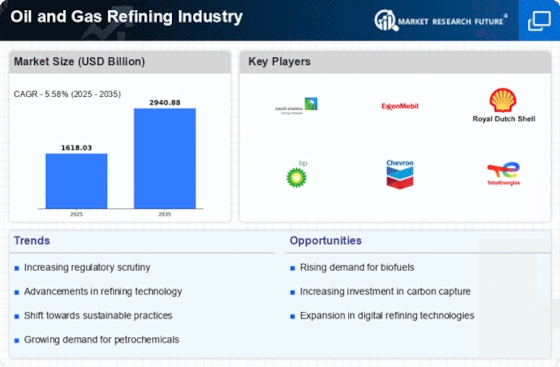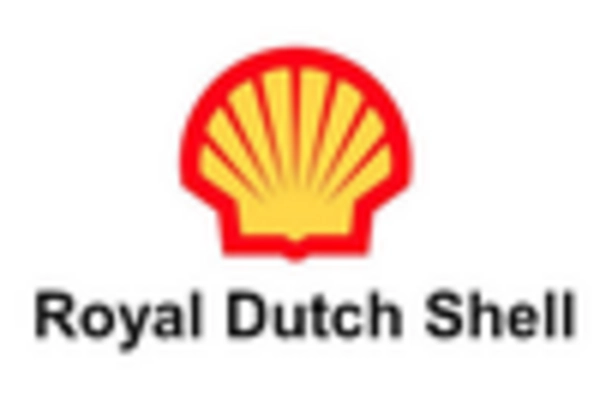-
EXECUTIVE SUMMARY
-
MARKET INTRODUCTION
-
Definition
-
Scope of the Study
- Research Objective
- Assumptions
- Limitations
-
RESEARCH METHODOLOGY
-
Overview
-
Data Mining
-
Secondary Research
-
Primary Research
- Primary Interviews and Information Gathering Process
- Breakdown of Primary Respondents
-
Forecasting Model
-
Market Size Estimation
- Bottom-Up Approach
- Top-Down Approach
-
Data Triangulation
-
Validation
-
MARKET DYNAMICS
-
Overview
-
Drivers
-
Restraints
-
Opportunities
-
MARKET FACTOR ANALYSIS
-
Value Chain Analysis
-
Porter’s Five Forces Analysis
- Bargaining Power of Suppliers
- Bargaining Power of Buyers
- Threat of New Entrants
- Threat of Substitutes
- Intensity of Rivalry
-
COVID-19 Impact Analysis
- Market Impact Analysis
- Regional Impact
- Opportunity and Threat Analysis
-
Oil Gas Refining Industry Market, BY COMPLEXITY TYPE
-
Overview
-
Topping
-
Hydro-Skimming
-
Conversion
-
Deep Conversion
-
Oil Gas Refining Industry Market, BY PRODUCT TYPE
-
Overview
-
Light Distillates
-
Middle Distillates
-
Fuel Oil
-
Others
-
Oil Gas Refining Industry Market, BY FUEL TYPE
-
Overview
-
Gasoline
-
Gasoil
-
Kerosene
-
LPG
-
Others
-
Oil Gas Refining Industry Market, BY APPLICATION
-
Overview
-
Transportation
-
Aviation
-
Marine Bunker
-
Petrochemical
-
Residential & Commercial
-
Agriculture
-
Electricity
-
Rail & Domestic Waterways
-
Others
-
Oil Gas Refining Industry Market, BY REGION
-
Overview
-
North America
- US
- Canada
-
Europe
- Germany
- France
- UK
- Italy
- Spain
- Rest of Europe
-
Asia-Pacific
- China
- India
- Japan
- South Korea
- Australia
- Rest of Asia-Pacific
-
Rest of the World
- Middle East
- Africa
- Latin America
-
COMPETITIVE LANDSCAPE
-
Overview
-
Competitive Analysis
-
Market Share Analysis
-
Major Growth Strategy in the Global Oil and Gas Refining Industry Market,
-
Competitive Benchmarking
-
Leading Players in Terms of Number of Developments in the Global Oil and Gas Refining Industry Market,
-
Key developments and Growth Strategies
- New Product Launch/Service Deployment
- Merger & Acquisitions
- Joint Ventures
-
Major Players Financial Matrix
- Sales & Operating Income, 2022
- Major Players R&D Expenditure. 2022
-
COMPANY PROFILES
-
CHINA NATIONAL PETROLEUM CORPORATION
- Company Overview
- Financial Overview
- Products Offered
- Key Developments
- SWOT Analysis
- Key Strategies
-
INDIAN OIL CORPORATION LIMITED
- Company Overview
- Financial Overview
- Products Offered
- Key Developments
- SWOT Analysis
- Key Strategies
-
EXXONMOBIL CORPORATION
- Company Overview
- Financial Overview
- Products Offered
- Key Developments
- SWOT Analysis
- Key Strategies
-
CHEVRON CORPORATION
- Company Overview
- Financial Overview
- Products Offered
- Key Developments
- SWOT Analysis
- Key Strategies
-
HINDUSTAN PETROLEUM CORPORATION LIMITED
- Company Overview
- Financial Overview
- Products Offered
- Key Developments
- SWOT Analysis
- Key Strategies
-
PJSC LUKOIL OIL COMPANY
- Company Overview
- Financial Overview
- Products Offered
- Key Developments
- SWOT Analysis
- Key Strategies
-
PETROLEOS DE VENEZUELA, S.A.
- Company Overview
- Financial Overview
- Products Offered
- Key Developments
- SWOT Analysis
- Key Strategies
-
RELIANCE INDUSTRIES LIMITED
- Company Overview
- Financial Overview
- Products Offered
- Key Developments
- SWOT Analysis
- Key Strategies
-
MARATHON PETROLEUM CORPORATION
- Company Overview
- Financial Overview
- Products Offered
- Key Developments
- SWOT Analysis
- Key Strategies
-
BP PLC
- Company Overview
- Financial Overview
- Products Offered
- Key Developments
- SWOT Analysis
- Key Strategies
-
BHARAT PETROLEUM CORPORATION LIMITED
- Company Overview
- Financial Overview
- Products Offered
- Key Developments
- SWOT Analysis
- Key Strategies
-
ROYAL DUTCH SHELL PLC
- Company Overview
- Financial Overview
- Products Offered
- Key Developments
- SWOT Analysis
- Key Strategies
-
APPENDIX
-
References
-
Related Reports
-
-
LIST OF TABLES
-
GLOBAL OIL AND GAS REFINING INDUSTRY MARKET, SYNOPSIS, 2018-2032
-
GLOBAL OIL AND GAS REFINING INDUSTRY MARKET, ESTIMATES & FORECAST, 2018-2032 (USD BILLION)
-
Oil Gas Refining Industry Market, BY COMPLEXITY TYPE, 2018-2032 (USD BILLION)
-
Oil Gas Refining Industry Market, BY PRODUCT TYPE, 2018-2032 (USD BILLION)
-
Oil Gas Refining Industry Market, BY FUEL TYPE, 2018-2032 (USD BILLION)
-
Oil Gas Refining Industry Market, BY APPLICATION, 2018-2032 (USD BILLION)
-
NORTH AMERICA: Oil Gas Refining Industry Market, BY COMPLEXITY TYPE, 2018-2032 (USD BILLION)
-
NORTH AMERICA: Oil Gas Refining Industry Market, BY PRODUCT TYPE, 2018-2032 (USD BILLION)
-
NORTH AMERICA: Oil Gas Refining Industry Market, BY FUEL TYPE, 2018-2032 (USD BILLION)
-
NORTH AMERICA: Oil Gas Refining Industry Market, BY APPLICATION, 2018-2032 (USD BILLION)
-
US: Oil Gas Refining Industry Market, BY COMPLEXITY TYPE, 2018-2032 (USD BILLION)
-
US: Oil Gas Refining Industry Market, BY PRODUCT TYPE, 2018-2032 (USD BILLION)
-
US: Oil Gas Refining Industry Market, BY FUEL TYPE, 2018-2032 (USD BILLION)
-
US: Oil Gas Refining Industry Market, BY APPLICATION, 2018-2032 (USD BILLION)
-
CANADA: Oil Gas Refining Industry Market, BY COMPLEXITY TYPE, 2018-2032 (USD BILLION)
-
CANADA: Oil Gas Refining Industry Market, BY PRODUCT TYPE, 2018-2032 (USD BILLION)
-
CANADA: Oil Gas Refining Industry Market, BY FUEL TYPE, 2018-2032 (USD BILLION)
-
CANADA: Oil Gas Refining Industry Market, BY APPLICATION, 2018-2032 (USD BILLION)
-
EUROPE: Oil Gas Refining Industry Market, BY COMPLEXITY TYPE, 2018-2032 (USD BILLION)
-
EUROPE: Oil Gas Refining Industry Market, BY PRODUCT TYPE, 2018-2032 (USD BILLION)
-
EUROPE: Oil Gas Refining Industry Market, BY FUEL TYPE, 2018-2032 (USD BILLION)
-
EUROPE: Oil Gas Refining Industry Market, BY APPLICATION, 2018-2032 (USD BILLION)
-
GERMANY: Oil Gas Refining Industry Market, BY COMPLEXITY TYPE, 2018-2032 (USD BILLION)
-
GERMANY: Oil Gas Refining Industry Market, BY PRODUCT TYPE, 2018-2032 (USD BILLION)
-
GERMANY: Oil Gas Refining Industry Market, BY FUEL TYPE, 2018-2032 (USD BILLION)
-
GERMANY: Oil Gas Refining Industry Market, BY APPLICATION, 2018-2032 (USD BILLION)
-
FRANCE: Oil Gas Refining Industry Market, BY COMPLEXITY TYPE, 2018-2032 (USD BILLION)
-
FRANCE: Oil Gas Refining Industry Market, BY PRODUCT TYPE, 2018-2032 (USD BILLION)
-
FRANCE: Oil Gas Refining Industry Market, BY FUEL TYPE, 2018-2032 (USD BILLION)
-
FRANCE: Oil Gas Refining Industry Market, BY APPLICATION, 2018-2032 (USD BILLION)
-
ITALY: Oil Gas Refining Industry Market, BY COMPLEXITY TYPE, 2018-2032 (USD BILLION)
-
ITALY: Oil Gas Refining Industry Market, BY PRODUCT TYPE, 2018-2032 (USD BILLION)
-
ITALY: Oil Gas Refining Industry Market, BY FUEL TYPE, 2018-2032 (USD BILLION)
-
ITALY: Oil Gas Refining Industry Market, BY APPLICATION, 2018-2032 (USD BILLION)
-
SPAIN: Oil Gas Refining Industry Market, BY COMPLEXITY TYPE, 2018-2032 (USD BILLION)
-
SPAIN: Oil Gas Refining Industry Market, BY PRODUCT TYPE, 2018-2032 (USD BILLION)
-
SPAIN: Oil Gas Refining Industry Market, BY FUEL TYPE, 2018-2032 (USD BILLION)
-
SPAIN: Oil Gas Refining Industry Market, BY APPLICATION, 2018-2032 (USD BILLION)
-
UK: Oil Gas Refining Industry Market, BY COMPLEXITY TYPE, 2018-2032 (USD BILLION)
-
UK: Oil Gas Refining Industry Market, BY PRODUCT TYPE, 2018-2032 (USD BILLION)
-
UK: Oil Gas Refining Industry Market, BY FUEL TYPE, 2018-2032 (USD BILLION)
-
UK: Oil Gas Refining Industry Market, BY APPLICATION, 2018-2032 (USD BILLION)
-
REST OF EUROPE: Oil Gas Refining Industry Market, BY COMPLEXITY TYPE, 2018-2032 (USD BILLION)
-
REST OF EUROPE: Oil Gas Refining Industry Market, BY PRODUCT TYPE, 2018-2032 (USD BILLION)
-
REST OF EUROPE: Oil Gas Refining Industry Market, BY FUEL TYPE, 2018-2032 (USD BILLION)
-
REST OF EUROPE: Oil Gas Refining Industry Market, BY APPLICATION, 2018-2032 (USD BILLION)
-
ASIA-PACIFIC: Oil Gas Refining Industry Market, BY COMPLEXITY TYPE, 2018-2032 (USD BILLION)
-
ASIA-PACIFIC: Oil Gas Refining Industry Market, BY PRODUCT TYPE, 2018-2032 (USD BILLION)
-
ASIA-PACIFIC: Oil Gas Refining Industry Market, BY FUEL TYPE, 2018-2032 (USD BILLION)
-
ASIA-PACIFIC: Oil Gas Refining Industry Market, BY APPLICATION, 2018-2032 (USD BILLION)
-
JAPAN: Oil Gas Refining Industry Market, BY COMPLEXITY TYPE, 2018-2032 (USD BILLION)
-
JAPAN: Oil Gas Refining Industry Market, BY PRODUCT TYPE, 2018-2032 (USD BILLION)
-
JAPAN: Oil Gas Refining Industry Market, BY FUEL TYPE, 2018-2032 (USD BILLION)
-
JAPAN: Oil Gas Refining Industry Market, BY APPLICATION, 2018-2032 (USD BILLION)
-
CHINA: Oil Gas Refining Industry Market, BY COMPLEXITY TYPE, 2018-2032 (USD BILLION)
-
CHINA: Oil Gas Refining Industry Market, BY PRODUCT TYPE, 2018-2032 (USD BILLION)
-
CHINA: Oil Gas Refining Industry Market, BY FUEL TYPE, 2018-2032 (USD BILLION)
-
CHINA: Oil Gas Refining Industry Market, BY APPLICATION, 2018-2032 (USD BILLION)
-
INDIA: Oil Gas Refining Industry Market, BY COMPLEXITY TYPE, 2018-2032 (USD BILLION)
-
INDIA: Oil Gas Refining Industry Market, BY PRODUCT TYPE, 2018-2032 (USD BILLION)
-
INDIA: Oil Gas Refining Industry Market, BY FUEL TYPE, 2018-2032 (USD BILLION)
-
INDIA: Oil Gas Refining Industry Market, BY APPLICATION, 2018-2032 (USD BILLION)
-
AUSTRALIA: Oil Gas Refining Industry Market, BY COMPLEXITY TYPE, 2018-2032 (USD BILLION)
-
AUSTRALIA: Oil Gas Refining Industry Market, BY PRODUCT TYPE, 2018-2032 (USD BILLION)
-
AUSTRALIA: Oil Gas Refining Industry Market, BY FUEL TYPE, 2018-2032 (USD BILLION)
-
AUSTRALIA: Oil Gas Refining Industry Market, BY APPLICATION, 2018-2032 (USD BILLION)
-
SOUTH KOREA: Oil Gas Refining Industry Market, BY COMPLEXITY TYPE, 2018-2032 (USD BILLION)
-
SOUTH KOREA: Oil Gas Refining Industry Market, BY PRODUCT TYPE, 2018-2032 (USD BILLION)
-
SOUTH KOREA: Oil Gas Refining Industry Market, BY FUEL TYPE, 2018-2032 (USD BILLION)
-
SOUTH KOREA: Oil Gas Refining Industry Market, BY APPLICATION, 2018-2032 (USD BILLION)
-
REST OF ASIA-PACIFIC: Oil Gas Refining Industry Market, BY COMPLEXITY TYPE, 2018-2032 (USD BILLION)
-
REST OF ASIA-PACIFIC: Oil Gas Refining Industry Market, BY PRODUCT TYPE, 2018-2032 (USD BILLION)
-
REST OF ASIA-PACIFIC: Oil Gas Refining Industry Market, BY FUEL TYPE, 2018-2032 (USD BILLION)
-
REST OF ASIA-PACIFIC: Oil Gas Refining Industry Market, BY APPLICATION, 2018-2032 (USD BILLION)
-
REST OF THE WORLD: Oil Gas Refining Industry Market, BY COMPLEXITY TYPE, 2018-2032 (USD BILLION)
-
REST OF THE WORLD: Oil Gas Refining Industry Market, BY PRODUCT TYPE, 2018-2032 (USD BILLION)
-
REST OF THE WORLD: Oil Gas Refining Industry Market, BY FUEL TYPE, 2018-2032 (USD BILLION)
-
REST OF THE WORLD: Oil Gas Refining Industry Market, BY APPLICATION, 2018-2032 (USD BILLION)
-
MIDDLE EAST: Oil Gas Refining Industry Market, BY COMPLEXITY TYPE, 2018-2032 (USD BILLION)
-
MIDDLE EAST: Oil Gas Refining Industry Market, BY PRODUCT TYPE, 2018-2032 (USD BILLION)
-
MIDDLE EAST: Oil Gas Refining Industry Market, BY FUEL TYPE, 2018-2032 (USD BILLION)
-
MIDDLE EAST: Oil Gas Refining Industry Market, BY APPLICATION, 2018-2032 (USD BILLION)
-
AFRICA: Oil Gas Refining Industry Market, BY COMPLEXITY TYPE, 2018-2032 (USD BILLION)
-
AFRICA: Oil Gas Refining Industry Market, BY PRODUCT TYPE, 2018-2032 (USD BILLION)
-
AFRICA: Oil Gas Refining Industry Market, BY FUEL TYPE, 2018-2032 (USD BILLION)
-
AFRICA: Oil Gas Refining Industry Market, BY APPLICATION, 2018-2032 (USD BILLION)
-
LATIN AMERICA: Oil Gas Refining Industry Market, BY COMPLEXITY TYPE, 2018-2032 (USD BILLION)
-
LATIN AMERICA: Oil Gas Refining Industry Market, BY PRODUCT TYPE, 2018-2032 (USD BILLION)
-
LATIN AMERICA: Oil Gas Refining Industry Market, BY FUEL TYPE, 2018-2032 (USD BILLION)
-
LATIN AMERICA: Oil Gas Refining Industry Market, BY APPLICATION, 2018-2032 (USD BILLION)
-
LIST OF FIGURES
-
RESEARCH PROCESS
-
MARKET STRUCTURE FOR THE GLOBAL OIL AND GAS REFINING INDUSTRY MARKET
-
MARKET DYNAMICS FOR THE GLOBAL OIL AND GAS REFINING INDUSTRY MARKET
-
GLOBAL OIL AND GAS REFINING INDUSTRY MARKET, SHARE (%), BY COMPLEXITY TYPE, 2022
-
GLOBAL OIL AND GAS REFINING INDUSTRY MARKET, SHARE (%), BY PRODUCT TYPE, 2022
-
GLOBAL OIL AND GAS REFINING INDUSTRY MARKET, SHARE (%), BY FUEL TYPE, 2022
-
GLOBAL OIL AND GAS REFINING INDUSTRY MARKET, SHARE (%), BY APPLICATION, 2022
-
GLOBAL OIL AND GAS REFINING INDUSTRY MARKET, SHARE (%), BY REGION, 2022
-
NORTH AMERICA: OIL AND GAS REFINING INDUSTRY MARKET, SHARE (%), BY REGION, 2022
-
EUROPE: OIL AND GAS REFINING INDUSTRY MARKET, SHARE (%), BY REGION, 2022
-
ASIA-PACIFIC: OIL AND GAS REFINING INDUSTRY MARKET, SHARE (%), BY REGION, 2022
-
REST OF THE WORLD: OIL AND GAS REFINING INDUSTRY MARKET, SHARE (%), BY REGION, 2022
-
GLOBAL OIL AND GAS REFINING INDUSTRY MARKET: COMPANY SHARE ANALYSIS, 2022 (%)
-
CHINA NATIONAL PETROLEUM CORPORATION: FINANCIAL OVERVIEW SNAPSHOT
-
CHINA NATIONAL PETROLEUM CORPORATION: SWOT ANALYSIS
-
INDIAN OIL CORPORATION LIMITED: FINANCIAL OVERVIEW SNAPSHOT
-
INDIAN OIL CORPORATION LIMITED: SWOT ANALYSIS
-
EXXONMOBIL CORPORATION: FINANCIAL OVERVIEW SNAPSHOT
-
EXXONMOBIL CORPORATION: SWOT ANALYSIS
-
CHEVRON CORPORATION: FINANCIAL OVERVIEW SNAPSHOT
-
CHEVRON CORPORATION: SWOT ANALYSIS
-
HINDUSTAN PETROLEUM CORPORATION LIMITED.: FINANCIAL OVERVIEW SNAPSHOT
-
HINDUSTAN PETROLEUM CORPORATION LIMITED.: SWOT ANALYSIS
-
PJSC LUKOIL OIL COMPANY: FINANCIAL OVERVIEW SNAPSHOT
-
PJSC LUKOIL OIL COMPANY: SWOT ANALYSIS
-
PETROLEOS DE VENEZUELA, S.A.: FINANCIAL OVERVIEW SNAPSHOT
-
PETROLEOS DE VENEZUELA, S.A.: SWOT ANALYSIS
-
RELIANCE INDUSTRIES LIMITED: FINANCIAL OVERVIEW SNAPSHOT
-
RELIANCE INDUSTRIES LIMITED: SWOT ANALYSIS
-
MARATHON PETROLEUM CORPORATION: FINANCIAL OVERVIEW SNAPSHOT
-
MARATHON PETROLEUM CORPORATION: SWOT ANALYSIS
-
BP PLC: FINANCIAL OVERVIEW SNAPSHOT
-
BP PLC: SWOT ANALYSIS
-
BHARAT PETROLEUM CORPORATION LIMITED: FINANCIAL OVERVIEW SNAPSHOT
-
BHARAT PETROLEUM CORPORATION LIMITED: SWOT ANALYSIS
-
ROYAL DUTCH SHELL PLC: FINANCIAL OVERVIEW SNAPSHOT
-
ROYAL DUTCH SHELL PLC: SWOT ANALYSIS



















Leave a Comment